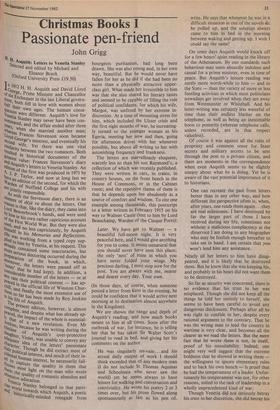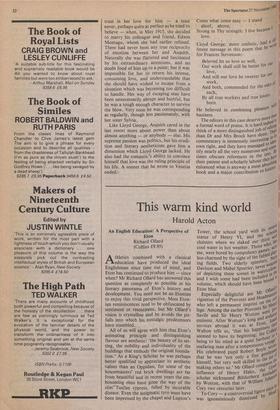Christmas Books I
Passionate pen-friend
John Grigg
11. li• Asquith: Letters to Venetia Stanley Selected and edited by Michael and Eleanor Brock
(Oxford University Press £19.50)
In 1912 H. H. Asquith and David Lloyd ,Gerge, Prime Minister and Chancellor n, the Exchequer in the last Liberal govern- hruent, both fell in love with women about "alf their own ages. The human conse- ?Itlences Were different. Asquith's love for Verse Stanley may never have been con- ''
YurnMated y
, and the affair ended after three ears, when she married another man; r, ° iereas Frances Stevenson soon became Y(1 George's , his sec()
mistress and
,; -nd wife. Yet there was eventually one vital "4rdlarity between the two romances. Both resulted in historical documents of the greatest value: Frances Stevenson's diary editionand quith's letters to Venetia Stanley. An
,, of the first was produced in 1971 by
have6,,J. P. Taylor, and now at long last we all edition of the second, for which the a arden of Nuffield College and his wife re jointly responsible. ei As with the Stevenson diary, there is an et/lent of deft) vu about the letters. One Leason is that, like the diary, they came into b°r,c1 Reaverbrook's hands, and were used Of the'1,411 in his own rather capricious account OWtne First World War. But they were also (171, and no less capriciously, by Asquith self in his Memories and Reflections. P‘'!I e was working from a typed copy sup- ailed to him by Venetia, at his request. This :_e4dY contained some inaccuracies, but syre serious doctoring occurred during the "reParation of the book, in which, niore °ver, the letters were passed off as considerable that he had kept). In addition, a ,?nsiderable number of the letters — or at gonaey rate their political content — has ap- chlried in the official life of Winston Chur- th:' and finally the most extensive use of in111,1 so far has been made by Roy Jenkins T life of Asquith. co ne present edition, however, is almost pearUPlete, and despite what has already ap- ilye-trkhe.clai the impact of the whole is essential- of a new revelation. Even Mr lifen ,Ins, because he was writing during the daughter tittle of Asquith's over-protective acie, Violet, was unable to convey any eh quote idea of the letters' passionate th_a.racter. Though he did extract most of eil;lr Political interest, and much of their in- aci ental human interest, he necessarily fail- thr to capture the quality in them that them: Most light on the man who wrote 001: ,t he quality of romantic abandon and ,,'essive adoration. ei: erietia Stanley belonged to that patri- 4t1q,,n world towards which Asquith, a poetic 4 historically- inded renegade from
bourgeois puritanism, had long been drawn. She was also young and, in her own way, beautiful. But he would never have fallen for her as he did if she had been no more than a physically attractive upper- class girl. What made her irresistible to him was that she also shared his literary tastes and seemed to be capable of filling the role of political confidante, for which his wife, Margot, was unfitted by her extreme in- discretion. At a time of mounting stress for him, which included the Ulster crisis and the first eight months of war, he increasing- ly turned to the younger woman as his Egeria, meeting her now and then, going for afternoon drives with her whenever possible, but above all writing to her with astonishing frequency and frankness.
The letters are marvellously eloquent, scarcely less so than his son Raymond's, a collection of which was recently published. They were written in cars, in trains, in country houses, on the front bench in the House of Commons, or in the Cabinet room; and the repetitive theme of them is that he depends upon her absolutely as a source of comfort and wisdom. To cite one example among thousands, this postscript to a letter written in February 1915 on his way to Walmer Castle (lent to him by Lord Beauchamp, Warden of the Cinque Ports):
Later. We have got to Walmer — a beautiful full-moon night. It is very peaceful here, and I would give anything for you to come. It seems unnatural that you should never have seen this place; the only 'nest' of mine in which you have never folded your wings. My precious darling, I must stop now for the post. You are always with me, nearer and dearer every day. Your own.
(In those days, of course, when someone posted a letter from Kent in the evening, he could be confident that it would arrive next morning at its destination almost anywhere in the Kingdom).
We are shown the range and depth of Asquith's reading, and how much books meant to him at all times. Soon after the outbreak of war, for instance, he is telling her that he has taken Sir Walter Scott's journal to read in bed, and giving her his comments on the author.
He was singularly un-vain ... and his actual daily output of work I should think exceeded that of any modern man (I do not include St Thomas Aquinas and Schoolmen who never saw the world) yet he seems always to have leisure for walking and conversation and conviviality. He wrote his poetry 2 or 3 times over, but his prose flowed along spontaneously as fast as his pen cd. write. He says that whenever he was in a difficult situation in one of the novels &c he pulled up, and the solution always came to him in bed in the morning between waking and getting up. I wish I could say the same!
On some days Asquith would knock off for a few hours' quiet reading in the library of the Athenaeum. By our standards such behaviour may seem absurdly indolent and casual for a prime minister, even in time of peace. But Asquith's leisure reading was surely more worth-while to him — and to the State — than the variety of more or less footling activities in which most politicians nowadays get involved when they are away from Westminster or Whitehall. And his letter-writing was certainly less wasteful of time than their endless blather on the telephone, as well as being an inestimable boon to posterity (whereas telephone calls, unless recorded, are in that respect valueless).
Of course it was against all the rules of propriety and common sense for State secrets and military secrets to be sent through the post to a private citizen, and there are moments in the correspondence when even Asquith seems to be slightly uneasy about what he is doing. Yet he is aware of the vast potential importance of it to historians.
One can recreate the past from letters better than in any other way, and how different the perspective often is, when, after years, one reads them again... they are real milestones. I have destroyed by far the larger part of those I have received during my life, sometimes not without a malicious complacency at the disservice I am doing to any biographer who may be foolish enough hereafter to take me in hand. I am certain that you won't lend him any assistance.
Nearly all her letters to him have disap- peared, and it is likely that he destroyed them. But he knew that she was keeping his, and probably in his heart did not want them to be destroyed.
So far as security was concerned, there is no evidence that his trust in her was misplaced. Though she did not keep all the things he told her entirely to herself, she seems to have been careful to avoid any dangerous disclosures. Perhaps after all he was right to confide in her, despite every rational argument to the contrary. That he was the wrong man to lead the country in wartime is very clear, and becomes all the clearer as we read the letters. But the mere fact that he wrote them is not, in itself, proof of his unsuitability. Indeed, one might very well suggest that the extreme boldness that he showed in writing them the willingness to ignore elementary rules and to back his own hunch — is proof that he had the temperament of a leader. Unfor- tunately his temperament was not, for other reasons, suited to the task of leadership in a wholly unprecedented kind of war.
Though Venetia did not seriously betray his trust in her discretion, she did betray his trust in her love for him — a trust never, perhaps quite as perfect as he tried to believe — when, in May 1915, she decided to marry his colleague and friend, Edwin Montagu, whom she had earlier refused. There had never been any true reciprocity of emotion between her and Asquith. Naturally she was flattered and fascinated by his extraordinary attentions, and no doubt fond of him up to a point; but it was impossible for her to return his intense, consuming love, and understandable that she should have wished to escape from a situation which was becoming too difficult to handle. Her way of escaping may have been unnecessarily abrupt and hurtful, but he was a tough enough character to survive the blow. Very soon he was corresponding as regularly, though less passionately, with her sister Sylvia.
Like Lloyd George, Asquith cared in the last resort more about power than about almost anything — or anybody — else. His supreme passion was politics, but his erudi- tion and literary aestheticism gave him a dimension which Lloyd George lacked. He also had the romantic's ability to convince himself that love was the ruling principle of his life. A sonnet that he wrote to Venetia ended:- Come what come may — I stand aloof, above, Strong in Thy strength: I live because I love.
Lloyd George, more realistic, had ate ferent message in this poem that he gir° for Frances Stevenson:-
Beloved let us love so well, Our love,
shall still be better for our lo And stillour love be sweeter for our And both, commended for the sake °I
each,
ByaolrInt.rue workers and true lovers b th He believed in combining pleasure Wi business. a formal aeditorslword ord in fthpirsacisaes.eIdteissehravredminocireee.tdito think of a more distinguished job of ecl,:htleir than Dr and Mrs Brock have done. "'its commentary is immensely interesting i.11,11, own right, and they have managed to lace, tify nearly all the very numerous and s°Illoy times obscure references in the text. their patient and scholarly labour they tog. enhanced what is anyway a most absory .,„I book and a major contribution to











































 Previous page
Previous page